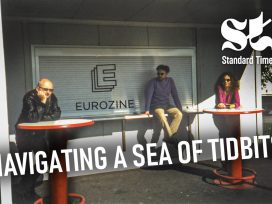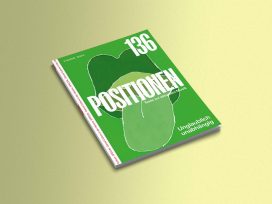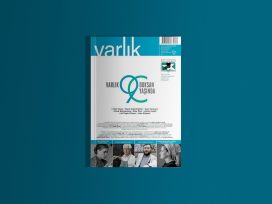Varlik finances itself entirely through sales and advertising. While both public and third-party funding bodies do exist at the national and regional levels to which we could (theoretically) resort, we haven’t done so for several reasons. One of these is that we don’t like to waste time with bureaucracy, the other being our aversion to the accompanying loss of independence. We do benefit from a yearly subscription to the public library network (301 copies out of a total of 1500), which is administered by the Ministry of Culture and Tourism. We make negligible use of voluntary unpaid work.
Financing European cultural journals
Like other types of cultural organization reliant on public funds, cultural journals throughout Europe have felt the impact of recession. In addition to funding cuts, journals are also having to negotiate the upheavals taking place in the print sector.
Through a European survey of financing for cultural journals, Eurozine takes stock of the situation of the network, in order to communicate its experiences internally and to others who hold a stake in European cultural policy today. [more]
Read the statements here:
Varlik, Turkey
Ord&Bild and Glänta, Sweden
Vikerkaar, Estonia
Wespennest, Austria
Sodobnost, Slovenia
Host, Czech Republic
Res Publica Nowa, Poland
Mute, UK
Intellectum, Greece
Blätter für deutsche und internationale Politik, Germany
In the long term, however, we may be in need of serious financial support if the downward trend in subscriptions and bookstore sales continues. For some years, the magazine has not been available in newsstands, due to the impossible costs the two main national distributors (both divisions of the biggest mainstream media conglomerates in Turkey) impose on serial publications with circulation numbers that do not meet
their criteria. Politics, cultural or otherwise, plays a role in the sense that publications addressing marginal segments of the market are expected to compete with mainstream media on the same terms, based on the ideology of the free market.
So while it makes no sense to talk about public funding policy with respect to Varlik itself, it can certainly be said that some periodicals do receive better treatment from various national and/or local government organs that sponsor cultural activities on the basis of their content. For instance, certain religious publications and daily papers connected to the Fethullah Gülen movement have a tremendous reach. These Mormon-like missionaries, who are supported by some of the biggest corporations in Turkey (such as the food conglomerate Ülker), enjoy the blessing of an important faction within the AKP. It’s not as if they needed it: Gülen owns a number of TV channels, radio stations and daily newspapers (including Zaman, which boasts a circulation of 1 million, the highest in the Turkish media.)
A good example of how cultural policy is influenced by politics in Turkey is prime minister Erdogan’s instruction to take down a huge sculpture, which he called a “monstrosity”, symbolizing “peace and reconciliation” near the Armenian border in Kars. It had been commissioned by the previous municipal administration – of a different political colour – as a gesture to its Armenian neighbours. Another example would be his orders to “privatize” state-owned theatres and operas while at the same time placing them largely under the supervision of people either from the ranks of the governmental bureaucracy or close to the AKP. Last but not least, it’s an open secret that Erdogan himself has been the main force behind the “cleansing” operation – i.e. the firing of unwelcome columnists and editors – throughout most of the opposition media.
As to whether changes in cultural policy can be seen in connection with the European economic crisis – probably not. The crisis has not had much of a bearing on our business here. When you are already crawling along at rock bottom levels, you cannot sink much deeper! As far as I can see, the wide-reaching austerity measures that have hit some parts of Europe have not yet arrived in Turkey. Whatever squeeze there is, it is being applied selectively, mostly in accordance with political aims.
In terms of Varlik‘s response to media change, we have a website but only publish on it the table of contents of the current issue. Our entire archive in digitized form is accessible on an independently administered, commercial platform (www.pecya.com), launched in 2008, where visitors can subscribe to a particular archive or download individual issues or articles for a small fee. The downward trend in circulation started in the late 1970s and cannot be associated with a single factor such as the rise of the Internet. If anything, the reason is a steep decline in interest for serious, critical writing, as elsewhere in Europe and the world. On the other hand, the collapse of the traditional mainstream media might even be to our advantage. People may be looking at our kind of content more favourably, since it provides criticism and analysis at a level that the mainstream media cannot and would not reach.
At least here in Turkey, print will probably remain the main cultural publishing format in the immediate future, though I may be indulging in wishful thinking. In the long run, however, I expect that digital media will encroach on most of our present territory. Whether that will make our form of publishing obsolete remains to be seen. We are aware of the shortening attention span in this digital age and in some cases try to get contributors to shorten their articles. As for adapting our content to new readership habits, it is a slow process for an 80-year old publication, but we do try to take into account readership feedback.
In terms of our responses to economic pressures, we are indeed broadening our field of activities to a certain extent. But, again, it is easier said than done in a small, family-run, 80 year-old publication. We have tried, successfully, in organizing events in recent years. Lobbying cultural decision makers has so far yielded little more than pleasant wishes and recommendations. We did appeal to the public via an editorial on our 75th anniversary year, in response to which we received some support from a couple of private institutions and persons (which are still continuing). But that’s all.
Because, in the short term, Varlik cannot take much part in the European scene, it is difficult to follow what is happening with our colleagues in Europe proper. However I do think that Eurozine and the like can help in sustaining cultural publishing in Europe, and that such organizations and networks can facilitate cultural interaction, the flow of ideas and, in general, conversation between entities at the periphery and at the centre of Europe. Eurozine has opened some windows for Varlik in the past and Varlik may, in turn, have contributed an “insider’s view” of what is happening in this part of the world.






